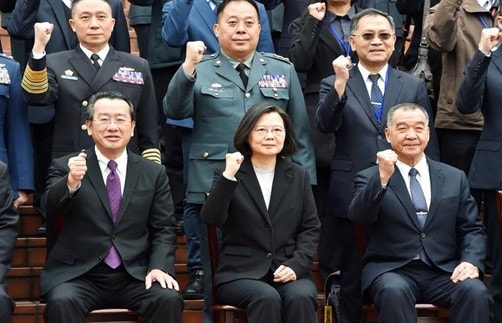On June 23, 2022, the U.S. and Taiwan concluded the annual high-level three-day security talks, known as the "Monterey Talks," in Washington D.C. China's Defense Ministry has often expressed its long-held view regarding U.S.-Taiwan defense relations, urging the U.S. to stop arms sales to the country, sever military ties with it, and stop sending "wrong signals" to "Taiwan independence separatist forces."[1]
The Chinese Defense Ministry also warned authorities in Taiwan's majority ruling Democratic Progressive Party (DPP) that "relying on foreign countries to seek independence" is pointless. It added that China's People's Liberation Army (PLA) would take powerful measures to resolutely thwart any form of external interference and separatist attempts at "Taiwan independence," and would defend Chinese national sovereignty and territorial integrity.[2]
It is worth noting that on June 21, 2022, as the Monterey talks were underway, China conducted its third-largest air incursion against Taiwan this year, with 29 Chinese warplanes entering its air defense zone.[3] Following this, Taiwanese Foreign Minister Joseph Wu tweeted: "The latest large-scale exercise by the PLA shows [that] authoritarian China's military threat is more serious than ever. But there's no way Taiwan will cave in and surrender its sovereignty and democracy to the big bully. Not a chance!"[4]
Commenting on the Monterey Talks, the CCP mouthpiece media outlet People's Daily wrote: "It is very much daydreaming for the secessionist forces on the island to even think about containing the PLA's military operations, no matter what kind of U.S. weapons they obtain – as the so-called asymmetric weapons are 'useless' when facing the PLA's absolute advantages."
Below is the People's Daily article:[5]

Taiwan's National Security Council Secretary-General Wellington Koo, Taiwan's President Tsai Ing-wen and Taiwan's Minister of National Defense Chiu Kuo-cheng. (Source: Taipeitimes.com)
'The So-Called Asymmetric Weapons Are 'Useless' When Facing The PLA's Absolute Advantages'
"The U.S. is expected to start annual high-level military security talks, known as the 'Monterey Talks,' with a delegation from the Taiwan authorities on Monday (US time). According to Japanese media reports, Washington is expected to list about 20 weapons for sale to the island, with emphasis on building 'asymmetric capability.'
"Chinese analysts commented that it is very much daydreaming for the secessionist forces on the island to even think about containing the People's Liberation Army (PLA)'s military operations no matter what kind of U.S. arms they obtain, as the so-called asymmetric weapons are 'useless' when facing the PLA's absolute advantages.
"According to Nikkei, the U.S. has prepared a military to-buy list for Taiwan authorities including anti-ship missiles, air defense and early warning systems.
"Taiwan-based media said that a delegation led by the head of the island's 'security council' Wellington Koo would attend the 'Monterey Talks.' The event is normally attended by retired or active U.S. military officers as well as representatives from the American Institute in Taiwan and arms dealers, experts told the Global Times previously.
"Some U.S. officials and lawmakers said one lesson of the Ukraine crisis is that the U.S. must help transform Taiwan into a 'porcupine' to deter potential attacks from the Chinese mainland, meaning that the island is suggested to buy large numbers of mobile, lethal weapons that are difficult to target and counter, rather than expensive, conventional platforms like the Abrams tanks, the New York Times reported.
"The HIMARS rocket system and ammunition with a range of 80 kilometers might be included in the list, which is designed to boost the island force to counter PLA landing operations, and weapons to complement the upgrade of F-16V fighter jets, and Harpoon anti-ship missiles and aerial torpedoes could be also listed for the same purpose, military expert Wei Dongxu told the Global Times on Monday.
"Wei pointed out that the weapons are not the most advanced ones, and most of them are outdated U.S. weapons gathering dust, and they will have limited help to build 'asymmetric capabilities.'
"Relying solely on the F-16v, an upgraded F-16, would never win Taiwan control of the air in a conflict against the PLA air force, Wei noted.
'The U.S. Is Only After Arms Deals'
"The U.S. is caught in an awkward place where it refuses to sell the more advanced F-35 stealth fighters to Taiwan, for fear the secessionist forces on the island would provoke the Chinese mainland and lead to a conflict that Washington is reluctant to be involved in, he said.
"Military expert Song Zhongping said it is impossible for Taiwan to form 'asymmetric capabilities,' no matter what kind of weapons it purchases from the U.S. as the gap between the military capacities of the two sides is 'too huge.'
"For example, the purchase of anti-ship missiles, such as the Harpoon anti-ship missiles to intercept PLA warships, would turn out useless, as the missiles would be destroyed as soon as the conflict starts due to the lack of surviving capability, Song explained.
"'These missiles would pose no threat to the PLA as the PLA would hold complete control of the skies before an amphibious warfare bursts out between the two sides across the Taiwan Straits,' Song explained.
"The U.S. wants the island to build its own intelligence-gathering system and sells a lot of facilities to it. But no matter what system the island builds, it would be controlled by the U.S.
"It is also unrealistic to boost the island's anti-submarine capability by simply buying a few submarines. The island has only a few of them that can be counted by a single hand, and the current Sea Dragon and Sea Leopard are too weak to form a real force for combat, Song added.
"The U.S. is only after arms deals by constantly cooking up new concepts and making a profit by selling obsolete weapons, Song said.
"The U.S. has acted faithlessly, keeps regressing from its commitments and the consensus it reached with China, and attempted to weaken and undermine the one-China principle and use Taiwan to contain China. This is a major threat to peace and stability across the Taiwan Straits, the Chinese Foreign Ministry noted in the Reality Check: Falsehoods in U.S. Perceptions of China released on Sunday.[6]
"According to Reality Check, in the military field, the U.S. has sold weapons at a larger scale and with enhanced capability including assault weapons such as anti-radiation missiles, heavy weight torpedoes, and F-16V fighter jets. To date, the U.S. has sold Taiwan arms worth over $70 billion."
[1] M.hinews.cn/mobile/show.php?url=http://www.hinews.cn/news/system/2022/06/23/032782278.shtml, June 23, 2022.
[2] M.hinews.cn/mobile/show.php?url=http://www.hinews.cn/news/system/2022/06/23/032782278.shtml, June 23, 2022.
[3] Taiwanplus.com/taiwan%20news/220622008?returnUrl=/taiwan%20news, June 22, 2022.
[4] Twitter.com/MOFA_Taiwan/status/1539392030673375234, June 22, 2022.
[5] En.people.cn/n3/2022/0621/c90000-10112302.html, June 21, 2022.
[6] Fmprc.gov.cn/eng/wjbxw/202206/t20220619_10706059.html, June 19, 2022.




